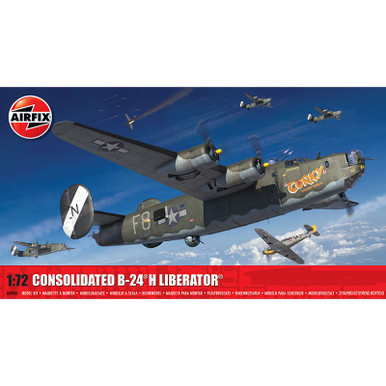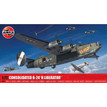 Loading... Please wait...
Loading... Please wait...- 07 38233033
- Home
- My Account
- Gift Certificates
- View Cart
- Home
- Model Kits
- Aircraft
- AIRFIX CONSOLIDATED B-24H LIBERATOR
AIRFIX CONSOLIDATED B-24H LIBERATOR
Product Description
The second of America's great four-engined heavy bombers of the Second World War, the Consolidated B-24 Liberator began development after the Army Air Corps approached the company to build B-17 Flying Fortresses. �Unimpressed at the prospect, Consolidated proposed that they could design and produce their own bomber in the same time it would take them to establish production lines, and it would be better than a Flying Fortress. �When their XB-24 prototype took to the air on 29th December 1939, it was a very different-looking aeroplane to the B-17 Flying Fortress, with its shoulder-mounted thin wings, deep, yet narrow fuselage and twin-boom tail, it had a maritime aircraft appearance about it.
Following its eventual USAAF introduction in 1941, the B-24 Liberator was produced in vast quantities, serving in every theatre during the Second World War, and making a vital contribution to the Allied War effort.
The introduction of the 'H' model addressed the aircraft's vulnerability to frontal attack, something enemy fighter pilots had been exploiting since the B-24's introduction. This variant was the first to be manufactured with an electrically operated Emerson A-15 nose turret but also had around 50 other modifications to make the Liberator a more combat-effective aircraft. This was also the first variant to truly take advantage of America's capacity for mass production and it was claimed that Ford could produce Liberators faster than the USAAF could process them into service.
The Consolidated B-24 Liberator became the most heavily produced four-engined bomber in the history of warfare and America's most produced aircraft of the Second World War. Quite simply, the B-24 was flown by more men, carried more bombs over greater distances and destroyed more targets than any other bomber in the history of aviation.
What's in the box?
- Plastic kit
- Instruction sheet
- Paint guide
- Decal Sheet
Specifications:
- Skill level: 3
- Parts: 278
- Scheme Options: 2
- Flying Hours: 3
- Finish: Plastic
Item Dimensions - Without Packaging:
- Wingspan (mm) = 465
- Length (cm) = 29.8
- Width (cm) = 46.5



